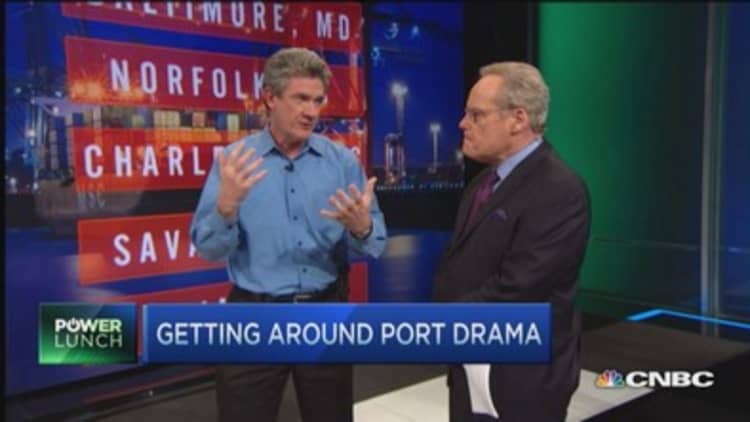
West Coast docks are paralyzed as employers and longshoremen continued to spat about contracts and congestion problems.
There are plenty of losers. Exporters, like farmers and ranchers, can't get their perishables to Asian markets during the Lunar New Year when demand for fruit and meat is particularly high. And importers large and small are beginning to report shipment delays and inventory shortages.
Are there winners? Kind of …
Air Freight
Some importers, like electronics dealers and luxury retailers, can afford to put their cargo on planes, despite at least a ten-fold increase in shipping costs. Their profit margin may be squeezed, but they are still making money in most cases.
Read MoreNo West Coast port deal: Source close to talks
"It becomes a question of the cost of a missed shipment versus the extra cost of shipping," said Kevin O'Marah, head of research for SCM World, a logistics think tank. Major cargo air carriers with Asia operations like UPS or FedEx will likely see a boost, at least in the short term.
The shift likely won't last forever, though. Ironically, given the present crisis, ocean freight over the years has been winning market share from air carriers, even with higher-margin goods, because of reliable shipping schedules and lower prices.
East Coast/Gulf Coast ports
The major ocean shipping lines serve both coasts of the United States. Ports on the East Coast are likely to see more traffic as those lines divert more cargo to their ships traveling to the U.S. East Coast via the Suez Canal.
Already some ports in the south, like Savannah, Ga., and Norfolk, Va., and on the Gulf Coast, like Houston, are seeing an uptick in traffic, as ship lines have diverted some cargoes to routes going through the Panama Canal.
The sudden influx of traffic, however, is presenting some congestion issues for those ports as well.
Railroads
The two primary railroads moving cargo from the West Coast, the BNSF Railway (owned by Warren Buffett's Berkshire Hathaway) and Union Pacific Corp., will suffer. But their eastern counterparts, CSX and Norfolk Southern, may see some added short-term business from diverted cargo.
"NS and CSX will handle any containers that make it to Savannah, New Orleans and places like that in the Southeast," said Lawrence Kaufman, a former railroad executive and noted railroad journalist and author, in an interview. "Remember, they interchange with the western railroads, so most of that is probably traffic they would have had anyway….If anyone is a winner, I'd put my money on CN (Canadian National) and CP (Canadian Pacific Railway)."
Those are the two major railroads likely to see a traffic pop from cargo diverted to the Canadian ports of Vancouver and Price Rupert. Indeed, traffic reports by the Association of American Railroads are already indicated a substantial pickup in traffic on Canadian routes.
Truckers
Diverted cargo may also mean added business for truckers plying the East Coast, mostly smaller players. But this could include larger publicly traded outfits like J.B. Hunt Transport , Knight Transportation, Heartland Express and Werner Enterprises.
Once again, though, it's a Peter-to-Paul situation. The major truckload operators serve both the West and East Coasts. So what traffic they pick up is very likely offset by what they lost elsewhere, experts suggest.
But there may be a bonanza later.
"Once things break loose you'll probably see a real premium for expedited truck transportation out of the West coast area, " said Larry Gross, senior consultant with FTR Transportation, in an interview.
"For now, though, I don't see a lot of winners out of this."

